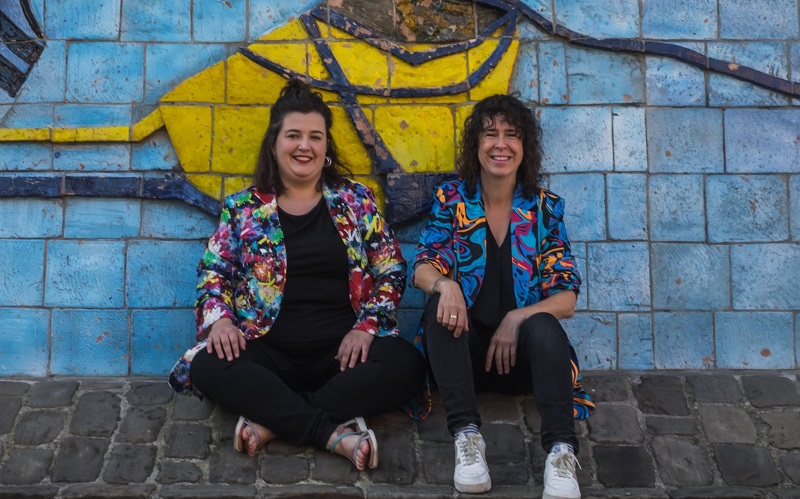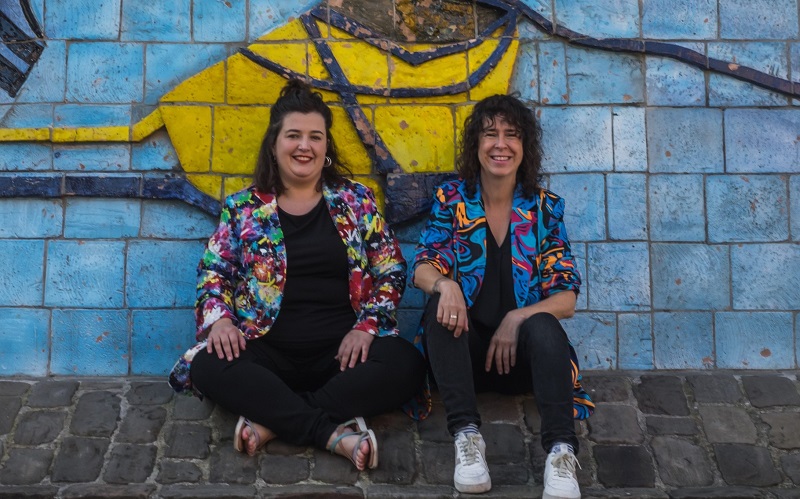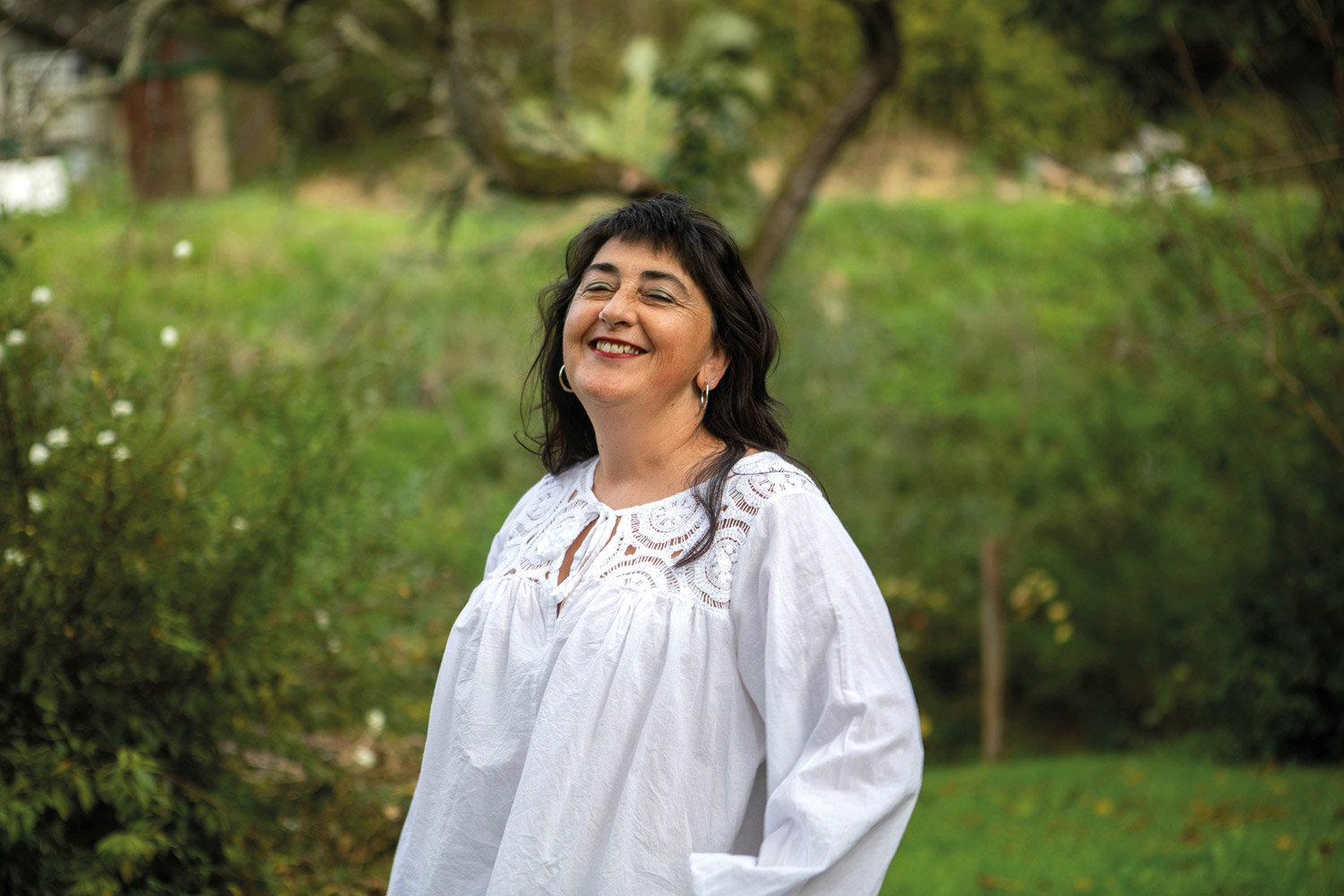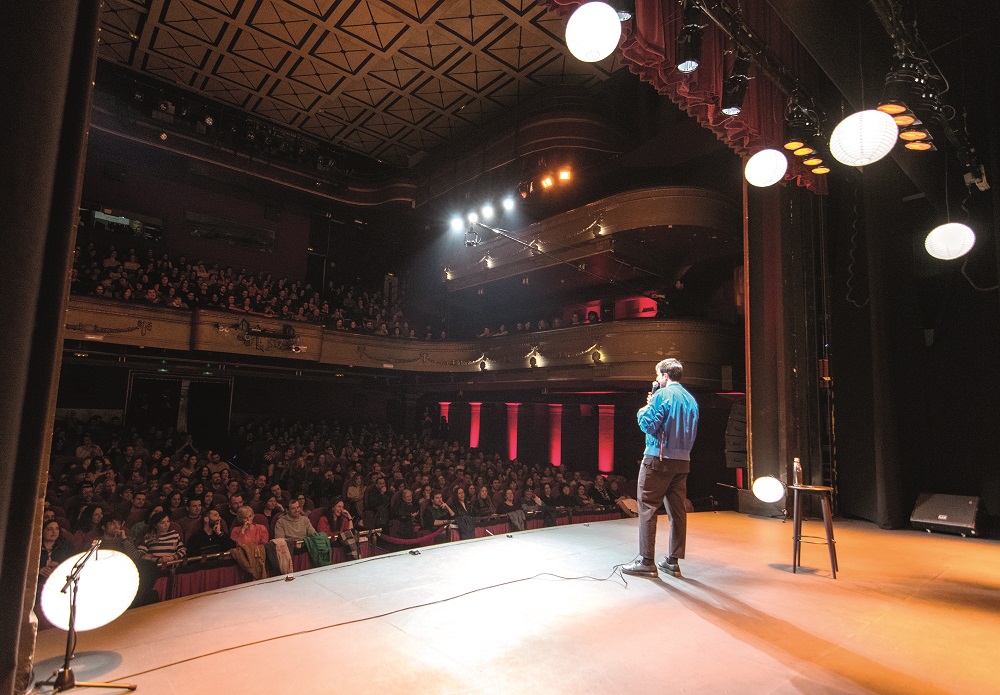"Courts and police stations are the places where I make the most humor"
- Ane Lindane will offer a special humor show on June 16 in Bilborock, Despotorre. He will collaborate with Raquel Torres, who aims to raise a level of feminist humor in the Basque Country, filling the premises with people. We have taken the opportunity to take the mood temperature.

What show are you preparing now?
Raquel Torres and I met a year ago and we started doing a show called Despotorre. We make a forty-five minute monologue and the topics we deal with are similar from our own experiences. In addition, we have organized the first Basque Country open books. After this tour we thought about doing something big and organized the show in Bilborock. We will act both, besides two other humorists and the pole dance show, among others.
You talked about similar issues, what are they?
We are two women of the same age and have had similar experiences. That's why we talk about feminism, that's what we have in common. Furthermore, we are also working on politics, especially I, because I am Basque and I have had it closer. Rachel is Extremadura. In general, everyone has their style, but we're pretty punkis doing humor, although Rachel says he's a joke. We don't have tobacco to deal with any subject, like sex.
You've commented before that you do open mic or open mic sessions. So far, in the Basque Country, has that not happened and are they creating something?
I don't know if we've been the first. In Bizkaia I am sure yes and in the CAV I think it has also been. Now there is more. What is done in jam sessions is done in an open mic, but working humor instead of music. We organize and present the participants. First, women, who are the ones we prioritize. They have ten minutes to test monologues. In fact, before you make a long monologue, you should know which jokes are good and which are not. To do so, you have to prove to the public. Open mic is much needed for humorists to try the text. In our case, five people are on the table, allowing them to choose the best or best functioning to use it in a long monologue.
Is there a lot of work behind a monologue writing at home?
Yes, it is. We spend hours writing and then we have to act in front of the public. It is very hard to see that they do not laugh, and that is why it is important to know the public as well. For example, some jokes in Bizkaia or Navarra are very successful and in Gipuzkoa do not laugh. As I have been in a thousand places lately, I know that there are texts that are not going to work well for certain people. The job is to know where and when some jokes will be welcomed and where not. Maybe the hardest part of the job.
Being a pioneer in the Basque Country, do you have referents?
"Some jokes in Bizkaia or Navarra are very successful and in Gipuzkoa do not laugh"
My referents are men. That's not a problem for me. There have always been humorist women and now they look more, I look closer than they appear, but until now I did not know them. I really like Miguel Noguera and I was a little admired by Les Luthiers. My trajectory started in cheese shops, sometimes with very bad results. Then I went to a monologue festival in the Basque Country and met Rachel there. He's an actor and he's been in the open Madrid comics. I have ever been, but he knows how a prestigious feminist humor group works that he knows closely and that, for example, works in Madrid. So when we got together, we decided that we didn't want to do it, because there are some macho tendencies that are repeated in what are in principle non-male models. We organize without exploiting anyone and have never waited for anyone's call.
Do you notice the influence of patriarchy when a woman takes the microphone?
Raquel and I say, in this sense, that Euskal Herria is a paradise. On the one hand, because it didn't exist before and because people had no prejudices. On the other hand, some areas of feminism are better here than others, although we have a lot to improve. In that bubble I feel very comfortable, even in the sessions we organize. In addition, when we are called, we are often at home, for example in cheese shops. However, when Rachel goes to Madrid to participate in an open mic, she always says that machismo is still terrible.
I have rarely felt it. For example, I made my monologue Machismo stand (Machismo arde) in the bar El Secreto garden and there I noticed the presence of the patriarchy. I had a very bad time, nobody laughed and I noticed that talking about a woman's defecation was very violent to the public. Then I also learned that a girl was exploding in that bar. However, this was in my first sessions, after the closure, and at that time it was pretty kamikazea. Many times people were surprised. Now I know what I can do and what not. It should be noted that for many the concept of a monologue is strange. For example, in the Shrines parties it was rare. In any case, in general, it is accepted that women make humor and those who do not have it I do not think they do because it is shameful. But on social media, they tell me everything.
Is that where you most notice machismo or misogyny?
Yeah, plus, I really want people who hate me. They are fantastic: machismo, misogyny, Euskalphobia, Euskaraphobia... All at once. There's no way of knowing who's writing on social media and I don't know exactly why I get to fascists. They say that the algorithm knows what your ideology is more or less and what makes you angry, and that's what it teaches you to interact with, because it answers. I don't know if that's why, but lately there are many fascists writing comments, some of them are very funny and I'll laugh. I like to insult myself and sometimes I turn on my phone just to read their insults. I am not scared or taken seriously, but some comments are impressive. For example, you recently told me that women are killed by people like me. So I thought, “Pof, little people out there.” It doesn't scare me, but it's significant. Others are more fun. In one monologue in Euskera about the career, another wrote to me that it was impossible to understand and get my penis out of my mouth. “Take the penis out of your mouth? That never!" I replied. The truth is, these insults and threats have never crossed the virtual space, except in Kabaret, where we make the open mics. Two people who wrote me about the poster. “Die with the third dose, the vulture.” They were anti-virals. It was great, my first live threat.
.JPG)
Is it possible to live in Basque Country thanks to comedy?
I don't know, I think it depends on the life you want. I don't think in principle, but what is comedy? Write scripts? Shows? There are many things. In any case, for the moment, I live thanks to the Income Guarantee Income, if I would not have sufficient resources. More and more work comes to me related to comedy, but it's not exactly a comedy: writers, collaborations, participation in round tables, actors... There are many proposals. In addition, in our show everything we do: posters, brochures, get sponsors to pay posters, rent Bilborock, hire artists, ask for advice to manage money... There are many responsibilities and all of them remain in our charge. I don't think Ignatius Farray does that. He only tells jokes.
I propose to get into the mud. Most of the time it is men who rob women’s visibility, but are they sometimes the culprits in your case?
"People who hate me are wonderful: machismo, misogyny, Euskaraphobia...
All at once."
I said so before. There are feminist or female comedy groups, but their working conditions are mere exploitation. There is no creativity, no feminism, they only use feminism as an excuse to squeeze young women out. Girls are paid little or not directly. That is to say, it repeats what happens in the Machistan areas. Then there are other cases where people who are not heading in the mood world get in the mood because the train is going, just because of the spectacularity that they have. We have put this train in motion with difficulty and suffering. We have had to work hard to spread our names and to do so we have done everything. For example, go to a town party at 15:00 to make a monologue and find us full of children. Let's see how you joke to eat penises!
Having lived through all this, we see people who have never done comedy and who have had visibility in other areas and occupy that place. Then he asks: “Where is creativity? Do you also do it in the name of feminism?” It happens. In any case, everything is very new and we may still need some codes. For example, understanding that something you're doing can be harmful to another woman. Maybe they don't know, and there's a lack of knowledge and a lack of solidarity, because they don't know which women are doing comedy. You don't know, but because you have a name, you go into comedy and suddenly they call you everywhere. What's more, you don't do it right or there are girls who do it a thousand times better than you do. In the end, this can be detrimental to those of us who make humor and humor that women do, probably because they don't do well, because they lack experience, not because they don't have capacity.
Politics is one of the foundations of your humor, because it's an important part of your life. Could you tell us how he won the Ertzaintza trial?
[Laughter] I didn't know that was going to come out! Let me take this answer calmly. Because I've had another trial recently, and on the other hand, they want to use the Mordaza Law against me. The truth is that the judgment I won the Ertzaintza is not very funny. It was actually the judge's merit, because he tried to identify the ertzaina that kicked me. In any case, the courts and police stations are the place where I have the most humor. With the Ertzainas, I make a very good mood and a lot of laughter. Recently some Ertzainas entered the portal of the building where I live with the owner of a house, because some guys occupied the house. At that time the kids were not inside and the police and the owner tried to get into the ground. The monologue was right in the middle of the trial, and then I left to avoid it. The portal was filled with ertzainas, giants, and I went out dressed at home, without underwear. I got the ertzaines, the breasts were pulled out... It seems I should always have my breasts in sight. In the midst of the confrontation, a police officer told me: “Miss, calm down” and I replied: “Haven’t you heard what comes out of my mouth? It is clear that I am not a Miss!” Then they told me they're going to use the Mordaza Law against me.
By:
Mirari Martiarena and Idoia Torrealdai.
When: 6 December.
Where: In the San Agustín cultural center of Durango.
------------------------------------------------------
The fourth wall breaks and interferes directly, standing and fearless. ZtandaP is a way of counting... [+]
By:
Mirari Martiarena and Idoia Torrealdai.
When: 6 December.
Where: In the San Agustín cultural center of Durango.
-------------------------------------------------
The fourth wall breaks and interferes directly, standing and fearless. ZtandaP is a way of counting from... [+]
I guess the "tired" would arrive in Pamplona at the penultimate Antton Telleria tour pass. However, he had some strength, before his double appointment for the next day, for the attendees of the Pamplona Theatre School and others to turn.
Enter and collar the room, accelerate in... [+]














